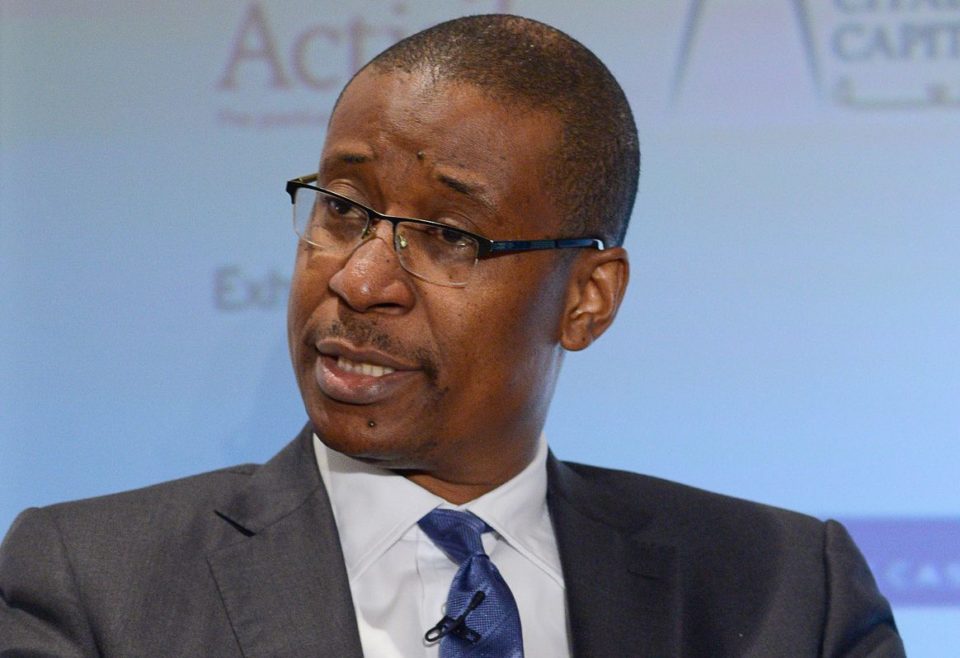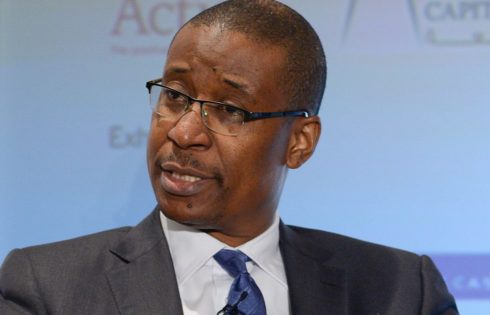
 …Aborts plan to make Council rubber stamp
…Aborts plan to make Council rubber stamp
President Muhammadu Buhari has rejected the recommendation of the Minister of Industry, Trade and Investment, Okechukwu Enelamah to remove from office, the executive secretary of the Financial Reporting Council (FRC), Jim Obazee.
FRC is a parastatal under the ministry and the minister is allegedly unhappy that he could not upturn certain regulatory decisions of the Council.
FRC metamorphosed from the Nigerian Accounting Standard Board (NASB) as Nigeria’s response to the collapse of WorldCom and the Enron, two giant firms that failed in the United States owing to auditors’ failure.
The Council was strengthened in 2003 to set accounting standards and also ensure that financial statements by firms engender confidence among both local and international investors. Federal lawmakers were spurred into strengthening the Council owing to the collapse in the early 2000s of African Petroleum Plc (Now Forte Oil) and the discovery that the firm, prior to its failure, was paying dividends with borrowed money.
Buhari’s intervention, according to informed sources, saved the institution from being a rubber stamp that could affect its focus at instituting transparency in Nigerians’ ways of doing business.
The sources also confirmed that the president’s rejection of Obazee’s sack also prevented the Council from being plunged into crisis that could have re-ignited the age-old rivalry between the Institute of Chartered Accountants of Nigeria (ICAN) and the Association of National Accountants of Nigeria (ANAN) owing to the background of appointees of the ministry that were scheduled to take over at FRC.
The ministry, according to InsideBusiness’ sources, had recommended Obazee’s sack and in his replacement, appointed Daniel Asaphokhia, who is said to be a close ally of Enelamah.
Asaphokhia is a partner at PricewaterhouseCoopers, an audit firm.
The ministry is also said to have presented for appointment as Chairman of the FRC, Segun Adebanjo who is a manager in African Capital Alliance Group limited, an investment firm which the minister co-founded and where he worked prior to his appointment as a minister.
InsideBusiness learnt that President Buhari’s opposition stemmed from the fact that the council is a leading light in the anti-corruption crusade and tinkering with its current leadership could have adverse effect on the global estimation of the administration especially as it makes efforts to repatriate the country’s stolen wealth.
A Presidency source also told InsideBusiness that Obazee would have been removed on May 29 this year, if the President had accepted the recommendation to sack the FRC boss.
The source said, “Obazee’s removal was expected to be announced on May 29 Democracy day during the President’s national broadcast. But, the President removed the portion from the speech”.
“What prevented the sack were the President’s reservations on some aspects of the ministry’s recommendation, and the facts that the removal was not based on allegations of wrongdoing.”
The president was said to have remarked that Obazee was in the middle of his second tenure and ought to have been allowed to complete the tenure which ends in 2018.
Obazee was appointed FRC boss in November 2010 on a four-year term and re-appointed in 2015 for another term that will end in 2018.
Buhari was also said to have frowned at the alleged usurpation of his power by the ministry which had gone ahead to appoint a replacement for Obazee and later return to the president for approval.
The ministry’s recommendation was said to have been in contrast with the enabling law of the FRC which empowers only the President to appoint the executive secretary.
Section 20 (1a) of the FRC act provides that “There shall be for the council, an executive secretary who shall be appointed by the president.”
In the memo from the ministry to the President, three names were suggested while Asaphokhia was penciled for appointment.
The statement in the ministry’s memo, “ostensibly on the recommendation of Mr President”, according to sources, meant that the provision of the FRC act was amended by the ministry to make sure there was a vacancy to be filled.
It is also seen as a clear usurpation of the president’s approving power.
The president, according to insiders, was not happy that the ministry had already decided to replace Obazee with Asaphokhia who is considered as an ally and teacher of the minister when he was studying for the Institute of Chartered Accountants of Nigeria (ICAN) certificate.
According to sources at the presidential villa, the Trade and Investment Ministry’s intention to appoint Segun Adebanjo as chairman of the board of the FRC, among the three proposed, did not also get the endorsement of the president.
Adebanjo is currently, a departmental head at African Capital Alliance Group and the President was said to have noted that having two close allies of the minister at such an important institution could turn it into a rubber-stamp.
Another error by the ministry, according to InsideBusiness’ findings, is that members of ICAN and that of the ANAN are recommended by the FRC Act to occupy the two topmost positions of the council to strike a balance and to prevent a recurrence of the rivalry between the two accounting bodies.
The two appointees recommended by the minister are both members of ICAN, a situation which the presidency said could create problems for the Council.
Efforts to confirm this from the minister and the ministry were not successful. Enquiries were sent on August 23 to Greyene Anosike, the ministry’s Director of Information. Enquiries were also sent to Enelamah on September 12 concerning the abortive attempt to restructure the FRC’s leadership.
Both refused to respond.
Investigation by this newspaper shows that the ministry’s memo to remove Obazee was the highpoint of intrigues to protect the duo of StanbicIBTC which is still under the regulatory order of the FRC and the KPMG which is also under suspension with its official.
A director at the Ministry of Trade and Investment hinted of efforts allegedly to protect the trio of StanbicIBTC, and KPMG from the wrath of the law.
“On the issue of Stanbic and KPMG, there is an unwritten directive to solve their problems by any means. We must make them happy” noted the ministry director who preferred anonymity because of the highly influential people involved.
Prior to the appointment of ministers in November 2015, President Buhari had approved for the FRC, the regulatory order on StanbicIBTC over some infractions by its management and board.
Sources at the ministry told InsideBusiness that the minister, Enelamah owing to his closeness to StanbicIBTC had on several occasions tried to overturn the regulatory order but without success.
FRC had on 28th October, 2015 issued a final notice and regulatory decision that amongst others, directed StanbicIBTC to restate and re-issue its 2013 and 2014 financial statements in addition to a penalty of N1 billion.
The Council also suspended the FRC registration of the bank’s Chairman, Atedo Peterside, that of its group managing director, Sola David-Borha, the Chief Finance Officer and the bank’s audit committee chairman.
The FRC’s action was based on the discovery of accounting irregularities in StanbicIBTC books as well as non-approval of its software by the National Office of Technology Acquisition and Promotion (NOTAP). The bank had without an approval from NOTAP, signed a sales purchase software agreement with its parent company in South Africa.
The bank on June 18, 2012 signed the agreement with its parent body, but approached NOTAP on July 3, 2013 for approval to sign the agreement which it had signed a year earlier. Unfortunately, NOTAP declined the bank’s request.
These acts by StanbicIBTC were declared illegal by Justice Buba of Federal High Court, Lagos in his ruling of 14th December, 2015.
This act by the bank allegedly denied Nigeria of N6.528 billion by way of tax on the softwares which is currently deployed in 17 countries from which royalties are being earned annually.
The minister is also said to be close to KPMG, the auditor to StancIBTC that was also suspended by the FRC in connection with the accounts of StanbicIBTC. The audit regulatory body wondered how the infractions went without a notice or warning from the audit giant.
The issue has cast doubt on the thoroughness and credibility of KPMG in Nigerian corporate world.
Nigeria was plagued by auditors’ failure in the 1990s and early 2000s when many Nigerians lost fortune owing to auditors’ misconducts.
The publication in the past, of fictitious financial reports not only killed the confidence of local investors but sent wrong signals to the international investing community.
Instances include – Lever Brothers Plc (Now Unilever), which overvalued its stocks in 1998; the case of African Petroleum (AP) Plc in which the company’s board concealed indebtedness in its year 2000 offer- for-sale and the one about Cadbury Nigeria Plc’s over bloated statement of account.
FRC has also come under criticism in the religious circle because of its insistence that businesses established by religious bodies must be subjected to the supervision of the laws.
The regulatory body issued a one-year grace in 2015 on the intervention of former president Goodluck Jonathan and the implementation is expected to start this year.
Church leaders are allegedly lobbying Vice-President Yemi Osinbajo who is a pastor to stall the implementation.
Source: Insidebusiness
